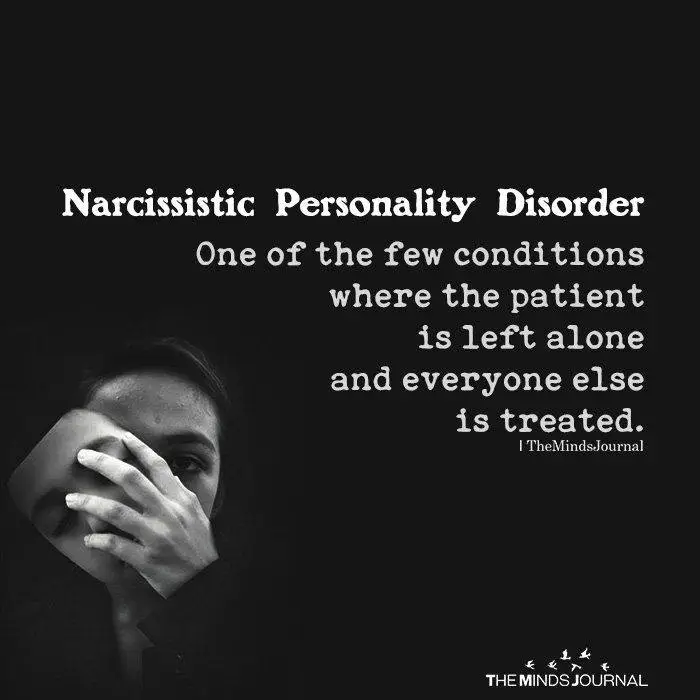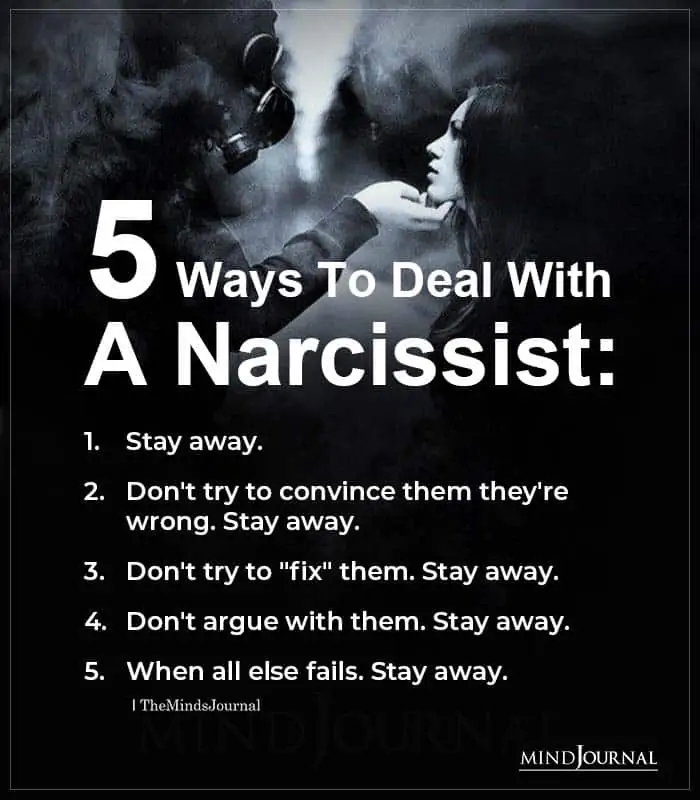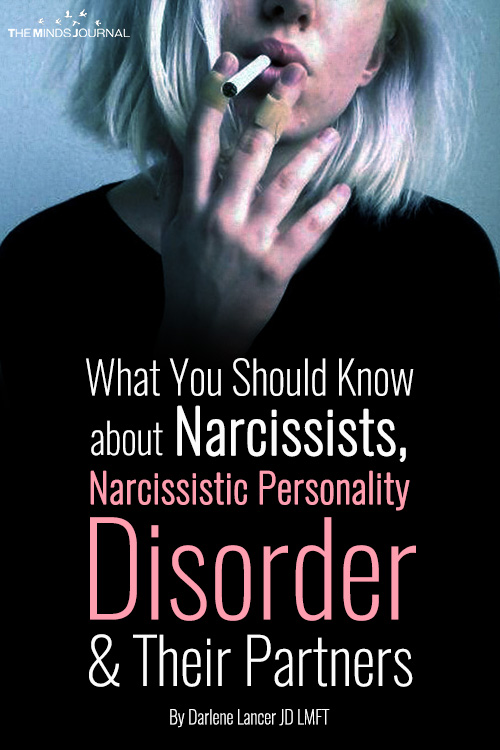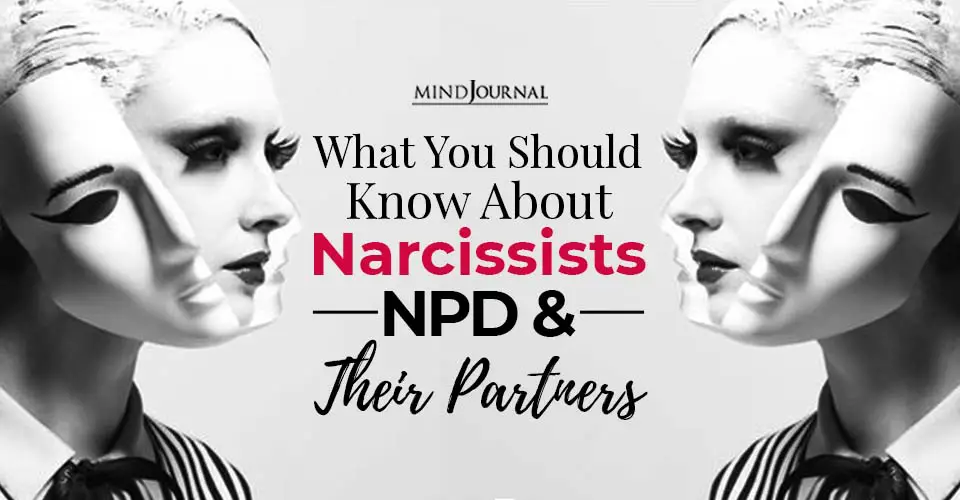The hallmarks of narcissistic personality disorder (NPD) and narcissists are grandiosity, a lack of empathy towards others, and a constant need for admiration. Narcissists only care about themselves.
Poor Narcissus. The gods sentenced him to a life without human love. He fell in love with his own reflection in a pool of water and died hungering for its response. Like Narcissus, narcissists only love themselves as reflected in the eyes of others.
It’s a common misconception that they love themselves. They actually dislike themselves immensely. Their inflated self-flattery, perfectionism, and arrogance are merely covers for the self-loathing they don’t admit–usually even to themselves. Instead, it’s projected outwards in their disdain for and criticism of others. They’re too afraid to look at themselves because they believe that the truth would be devastating.
Actually, they don’t have much of a Self at all. Emotionally, they’re dead inside and they hunger to be filled and validated by others. Sadly, they’re unable to appreciate the love they do get and alienate those who give it.
Related: 5 Most Common Signs of Narcissism
Diagnosis of Narcissism: NPD
All personality traits, including narcissism, range from mild to severe. Narcissism can be viewed on a continuum from mature to archaic. Mature individuals are able to idealize romantic partners, express their talents and skills, and accomplish their goals while employing only neurotic defenses; a middle group has unstable boundaries and employ borderline defenses; and those highly sensitive to wounding, employ destructive, psychotic defenses and have unstable relationships (Solomon, 1989).
Narcissistic Personality Disorder (NPD), first categorized as a disorder by the American Psychiatric Association in 1987, occurs in 1 to 6.2 percent of the population; males exceed females at a ratio of 3:2 (Dhawan, 2010; McClean, 2007). Although nonprofessionals often label people with NPD who show a few narcissistic traits, clinical NPD ranges in severity from those with only the minimum required five diagnostic traits to narcissists who strongly manifest all nine symptoms.
Here’s a summary of the Diagnostic Criteria in the DSM-5:
Someone with a pervasive pattern of grandiosity (sometimes only in fantasy), need for admiration from others, and lack of empathy, beginning in childhood, as indicated by five of these characteristics:
1. Has a grandiose sense of self-importance and exaggerates achievements and talents.
2. Dreams of unlimited power, success, brilliance, beauty, or ideal love.
3. Believes he or she is special and unique, and can only be understood by, or should associate with, other special or high-status people or institutions.
4. Requires excessive admiration.
5. Unreasonably expects special, favorable treatment or compliance with his or her wishes.
6. Exploits and takes advantage of others to achieve personal ends.
7. Lacks empathy for the feelings and needs of others.
8. Envies others or believes they’re envious of him or her.
9. Has arrogant behaviors or attitudes.
In addition to the grandiose “Exhibitionist Narcissist” described above, James Masterson identifies a “Covert” or “Closet Narcissist”–someone with a deflated, inadequate self-perception, a sense of depression and inner emptiness. He or she may appear shy, humble or anxious, because his or her emotional investment is in the idealized other, which is indirectly gratifying (Masterson, 2004).
“Malignant” narcissists are the most pernicious and hostile, enacting anti-social behavior. They can be cruel and vindictive when they feel threatened or don’t get what they want.

Cause of Narcissism
It’s hard to empathize with narcissists, but they didn’t choose to be that way. Their natural development was arrested due to faulty, early parenting, usually by a mother who didn’t provide sufficient nurturing and opportunity for idealization. Some believe the cause lies in extreme closeness with an indulgent mother, while others attribute it to parental harshness or criticalness.
This latter position stems from Otto Kernberg’s emphasis on parental anger, envy, and hate, or indifference that expresses veiled aggression. (Ellis, 2009; Russell, 1985)
Related: The 4 Types of Narcissism Share A Core Trait
The two views converge on the underlying psychodynamics. An idealizing, indulgent mother may be unable to experience her child as a separate individual and provide sufficient empathy, mirroring, or opportunity for idealization.
Although leniency can result in healthy narcissism, when psychological control is added, like guilt induction and withdrawal of love, a solid self doesn’t develop, because the child’s focus is to gain external approval. Rather than receiving support for an emerging autonomous self, the child learns that love and involvement are conditioned on conforming to parental needs and expectations. (Horton, Bleau, & Drwecki, 2006)
Heinz Kohut observed this in his narcissistic clients who suffered from profound alienation, emptiness, powerlessness, and lack of meaning. Beneath a narcissistic façade, they lacked sufficient internal structures to maintain cohesiveness, stability, and a positive self-image to provide a stable identity. (Russell, 1985) He believed the cause lay in the empathic failure between the caregiver and child.
He differed from Otto Kernberg, who thought the pathology began during the oral stage, claiming that it could even begin in latency. Narcissists are uncertain of the boundaries between themselves and others and vacillate between dissociated states of self-inflation and inferiority. The self divided by shame is made up of the superior-acting, grandiose self and the inferior, devalued self. When the devalued self is in an inferior position, shame manifests by idealizing others.
When the individual is in a superior position, defending against shame, the grandiose self aligns with the inner critic and devalues others through projection. Both devaluation and idealization are commensurate with the severity of shame and the associated depression (Lancer, 2014).
Although most people fluctuate in these positions, the Exhibitionistic and Closet Narcissists are more or less static in their respective superior and inferior positions irrespective of reality, making them pathological. Arrogance, denial, projection, envy, and rage are among the defenses to shame (Lancer, 2014).
Although more research is required, twin studies revealed a 64-percent correlation of narcissistic behaviors, suggesting a genetic component (Livesley, Jang, Jackson, & Vernon, 1993).
Relationships with Narcissists
It’s easy to fall in love with narcissists. Their charm, talent, success, beauty, and charisma cast a spell, along with compliments, scintillating conversation, and even apparent interest in others. Enlivened by their energy, people gravitate towards them and are proud to bask in their glow.
The Narcissist
At home, narcissists are totally different than their public persona. They may privately denigrate the person they were just entertaining. After an initial romance, they expect appreciation of their specialty and specific responses through demands and criticism in order to manage their internal environment and protect against their high sensitivity to humiliation and shame.
Relationships revolve around them, and they experience their mates as extensions of themselves. Understanding narcissism, how narcissists’ brains are wired, and what drives their behavior can help you detach, not react, and deal with them more effectively.
Many narcissists are perfectionists. Nothing others do is right or appreciated. Their partners are expected to meet their endless needs when needed – for admiration, service, love, or purchases – and are dismissed when not. That their spouse is ill or in pain is inconsequential.
Narcissists don’t like to hear “No” and often expect others to know their needs without having to ask. They manipulate to get their way and punish or make partners feel guilty for turning them down. Trying to please the narcissist is thankless, like trying to fill a bottomless pit. Their criticisms can escalate to narcissistic abuse.
They can make their partners experience what it was like having had a cold, invasive, or unavailable narcissistic parent. Anne Rice’s vampire Lestat had such an emotionally empty mother, who devotedly bonded with him to survive. The deprivation of real nurturing and lack of boundaries make narcissists dependent on others to feed their insatiable need for validation.
Related: How to Leave A Narcissist or Abuser
The Narcissist’s Partner
Although their partners feel loved when the narcissist bestows caring words and gestures, is madly possessive, or buys expensive gifts, they doubt his or her sincerity and question whether it’s really manipulation, pretense, or a manufactured “as if” personality. They feel tense and drained from unpredictable tantrums, attacks, false accusations, criticism, and unjustified indignation about small or imaginary slights.
These partners also lack boundaries and absorb whatever is said about them as truth. In vain attempts to win approval and stay connected, they sacrifice their needs and thread on eggshells, fearful of displeasing the narcissist. They daily risk blame and punishment, love being withheld, or a rupture in the relationship.
They worry about what their spouses will think or do, and become as pre-occupied with the narcissist as they are with themselves. Partners have to fit into the narcissists’ cold world and get used to living with emotional abandonment.
Soon, they begin to doubt themselves and lose confidence and self-worth. Communicating their disappointment gets twisted and is met with defensive blame or further put-downs. The narcissist can dish it, but not take it. Nevertheless, they stay, because periodically the charm, excitement, and loving gestures that first enchanted them return, especially when the narcissist feels threatened that a break-up is imminent.
When two narcissists get together, they fight over whose needs come first, blame, and push each other away, yet are miserable needing each other.

Codependency
Despite having a seemingly strong personality, narcissists lack a core self. Their self-image and thinking and behavior are other-oriented in order to stabilize and validate their self-esteem and fragile, fragmented self. They share codependent core symptoms of denial, control, shame, dependency (unconscious), and dysfunctional communication and boundaries, all leading to intimacy problems.
One study showed a significant correlation between narcissism and codependency (Irwin, 1995). Although more aggressive than passive, in my opinion, they are codependent.
Accommodating codependents and narcissists can be a perfect fit, albeit painful because the latter’s attributes and aura of success boost the former’s low self-esteem, which allows accommodators to tolerate emotional abuse.
Typically, accommodators aren’t authoritative and prefer a non-assertive, subordinate role, because their own power and often anger are repressed, frightening, and shame-bound. They seek and hunger for missing parts of themselves and idealize new partners’ qualities, which they hope to absorb. This is why two accommodators rarely get together.
They’re in awe of narcissists’ self-direction and “strength,” and live vicariously in the reflection of their success, power, protection, and charisma, while unaware of narcissists’ fragile personas and hidden shame (Lancer, 2014).
Accommodators attach to narcissists who appear bold and express their needs and anger, yet themselves feel needless and suffer guilt when they assert themselves. Caretaking and pleasing make codependents feel valued. Because they feel undeserving of receiving love, they don’t expect to be loved for who they are–only for what they give or do (Lancer, 2014).

Narcissists are also drawn to their opposites to support their pride and fill their emptiness–partners who are emotionally expressive and nurturing, qualities they lack. They need partners they can control who won’t challenge them and make them feel weak (Lancer, 2014).
Related: 7 Sneaky Things Narcissists Say to Get You Back
Often in these relationships, narcissists are the distancers when more than sex is anticipated. Getting emotionally close means giving up power and control. The thought of being dependent is abhorrent. It not only limits their options and makes them feel weak, but also exposes them to rejection and feelings of shame, which they keep from consciousness at all costs.

(Lancer, 2014) Their anxious partners pursue them, unconsciously replaying emotional abandonment from their past. Underneath they both feel unlovable.
For loved ones of narcissists, doing the exercises and using the recommended strategies in Dealing with a Narcissist: 8 Steps to Raise Self-Esteem and Set Boundaries with Difficult People can be helpful in dealing with a narcissist. Doing them can also help an ambivalent partner get clearer about whether he or she wants to stay in the relationship. See also Therapy for NPD and Narcissists.
© Darlene Lancer, 2015
Published in The Therapist, July, 2015
Written by Darlene Lancer Originally appeared on WhatIsCodependency.com Republished with permission











Leave a Reply
You must be logged in to post a comment.